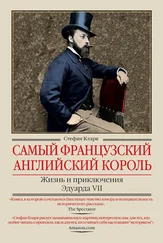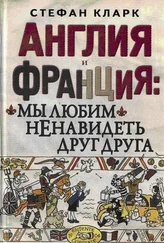Стефан Кларк - 1000 Years of Annoying the French
Здесь есть возможность читать онлайн «Стефан Кларк - 1000 Years of Annoying the French» весь текст электронной книги совершенно бесплатно (целиком полную версию без сокращений). В некоторых случаях можно слушать аудио, скачать через торрент в формате fb2 и присутствует краткое содержание. ISBN: , Издательство: Transworld Digital, Жанр: Старинная литература, на английском языке. Описание произведения, (предисловие) а так же отзывы посетителей доступны на портале библиотеки ЛибКат.
- Название:1000 Years of Annoying the French
- Автор:
- Издательство:Transworld Digital
- Жанр:
- Год:неизвестен
- ISBN:9781407067629
- Рейтинг книги:3 / 5. Голосов: 1
-
Избранное:Добавить в избранное
- Отзывы:
-
Ваша оценка:
- 60
- 1
- 2
- 3
- 4
- 5
1000 Years of Annoying the French: краткое содержание, описание и аннотация
Предлагаем к чтению аннотацию, описание, краткое содержание или предисловие (зависит от того, что написал сам автор книги «1000 Years of Annoying the French»). Если вы не нашли необходимую информацию о книге — напишите в комментариях, мы постараемся отыскать её.
1000 Years of Annoying the French — читать онлайн бесплатно полную книгу (весь текст) целиком
Ниже представлен текст книги, разбитый по страницам. Система сохранения места последней прочитанной страницы, позволяет с удобством читать онлайн бесплатно книгу «1000 Years of Annoying the French», без необходимости каждый раз заново искать на чём Вы остановились. Поставьте закладку, и сможете в любой момент перейти на страницу, на которой закончили чтение.
Интервал:
Закладка:
It was at this point that King Philippe VI of France made the huge mistake of irritating the newly blooded young ruler.
In May 1334, Philippe invited the ten-year-old king of Scotland, David II, to take refuge from the English in France, and warned Edward III to stop bullying wee Davie. This was a provocative warning, because in giving it Philippe was repeating the old French taunt that the King of England was a feudal vassal of the King of France. Richard the Lionheart’s claim that an English king had no superior except Dieu still hadn’t convinced the French at all. And as if this wasn’t bad enough, the Bishop of Rouen gave a sermon gleefully announcing that a 6,000-strong French army was getting ready to go and defend Scotland against English incursions.
So King Edward did what any red-blooded Englishman would have done: he claimed the throne of France.
All queens are illegal, but some are less illegal than others
Edward’s mother Isabelle had already tried to claim France for herself in 1328. She was the sister of the recently deceased French King Charles IV, who had died leaving a baby girl as his only heir. Isabelle therefore argued that she was the natural candidate for succession. However, the assembly gathered to debate the succession refused Isabelle’s claim because, as a contemporary chronicler, Jean Froissart, recorded, ‘the realm of France was so noble that it must not fall into a woman’s hands.’
In the event, the vacant throne was grabbed by Philippe VI, a 35-year-old champion jouster with a large army – the sort who quite often used to win arguments about who was going to be a medieval ruler. And Edward III seems to have forgotten about his mother’s claim to the French crown until 1334, when Philippe made the mistake of declaring that he was a Scotland supporter.
Trouble was further stirred up by the presence at Edward’s court of a scheming French nobleman, a fifty-year-old bon vivant called Robert d’Artois. Robert was King Philippe VI’s brother-in-law, and had fled to England after – it was rumoured – poisoning his aunt to try and steal her inheritance. If true, this was small beer for the times, but Robert was sentenced to death and exiled. When Philippe VI announced that anyone who harboured Robert would be considered his mortal enemy, Edward took him in, made him an earl and gave him three castles. A clear statement if ever there was one.
A classic brother-in-law, and French to boot, Robert could not resist whinging about Philippe and egging Edward on to claim his ‘rightful inheritance’. According to a poem of the time, ‘Les Voeux du héron’ – ‘The Vows of the Heron’ – Robert brought matters to a head at a banquet in 1338, during which he accused Edward III of being a coward for not invading France, and cajoled the influential dinner guests into promising that they would help Edward win the French throne. Robert did this by taking an oath over a cooked heron (a timid bird that symbolized cowardice), 1and getting the other participants to invent variations on the vow – a fashionable dinner-party game in the early fourteenth century.
Before you could say who wants to pull the heron wishbone, Edward had announced his intention to go and grab the French Crown, and even designed himself a new coat of arms – a combination of England’s rampant lions and the French fleur-de-lis. The new Anglo-French banner, which would have come with matching shield, helmet, doublet and squire’s uniform, was the rudest, most provocative insult that Edward could have conceived, a bit like sleeping with a modern Frenchman’s wife and putting the video on YouTube. With one bit of fashion design, Edward had just made it likely that the coming war was going to be very brutal indeed.
How to get funding for your conflict
Edward III was no longer a disturbed adolescent. In his mid-twenties, he was by all accounts a well-bred and learned man, who could even write. His first language was Anglo-Norman, as it was for all his class, but he was able to speak English like a native (which, of course, he was), and could understand Latin, German and Flemish. He also had, as one contemporary put it, ‘the face of a god’, and used it to maximum effect, enticing countless women with a shake of his long blond locks, a royal smile, and no doubt the odd Flemish joke.
He didn’t limit his charms to sexual encounters either, and as soon as his mind was set on war, he embarked on a spectacularly successful career as a royal conman, wheedling a war chest out of a whole series of rich bankers and merchants in Italy, Holland and England, almost all of whom later went bankrupt when he failed to pay them back.
Edward also pawned not only his own English crown, but the one he had had made, rather optimistically, for when he would be crowned King of France.
Philippe VI, on the other hand, had severe problems getting funding for his war. Even in those days, the French liked nothing better than ignoring laws, and many of them refused to pay taxes. Philippe had to resort to slapping a duty on salt and debasing his currency, calling in silver coins and reissuing them in cheap metal. In the end, he was forced to top up his war chest by borrowing a million gold florins from the Pope. 2
Philippe used his funding to raise an army of some 60,000 heavy cavalry, many of them aristocrats in search of a reputation as knights. Edward did more or less the opposite, and wrote to England’s constables and bailiffs instructing them to send him the most suitable candidates for warfare aged between sixteen and sixty. As well as selecting the best longbowmen, most of these local officials also took the opportunity to pack off their thieves and murderers.
So while France’s noblest knights strapped on their armour and tested each other on the rules of chivalry, thousands of English criminals were swapping hints on the best way to stab toffs.
Giving massacre a bad name
If any excuse is needed for the horrors that were about to be inflicted on France, it should be stressed that the French started it.
In 1337 they began to raid the English coast, and over the following year, Rye, Hastings, Portsmouth, Southampton, the Isle of Wight and Plymouth were all attacked and looted. English merchant vessels were captured, and French ships even sailed into the Thames Estuary. Rumours of a massive French invasion began to circulate, and it was said that captured Kentish fishermen were being tortured and paraded through the streets of Calais.
The English quickly realized that this raiding business was a good idea, and Norman and Breton ports began to get a taste of their own medicine. Sometimes, the English raiders were even able to steal back plunder that had recently been taken from their own towns. Soon, no ship in the Channel was safe. The Cornish port of Fowey had a band of pirates who roamed the coasts of England and France, and even attacked English ships. Though, as Cornishmen, they no doubt regarded the English as foreign, too.
Then came the invasion proper. In September 1339, Edward III attacked France with a force of around 15,000 men, many of whom were Dutch and German mercenaries paid for by his borrowed money. Philippe VI was waiting for them at a place called La Flamengrie in northeastern France with an army of 35,000. Even though Philippe had numerical superiority, he offered to make a sporting occasion of the battle by proposing a sort of tournament between France’s paladins – its noblest knights – and the best men in the English army. This may well have been a jibe at Edward, who had been one of the paladins until Philippe confiscated his French lands.
Edward was spoiling for a fight – not just because he was that kind of guy but also because his Dutch and German mercenaries were complaining about not having enough food and threatening to go home. So he agreed to meet Philippe however he wanted, in a massive clash of two armies or a more chivalrous face-off between individual knights. In the end, though, Philippe simply didn’t turn up.
Читать дальшеИнтервал:
Закладка:
Похожие книги на «1000 Years of Annoying the French»
Представляем Вашему вниманию похожие книги на «1000 Years of Annoying the French» списком для выбора. Мы отобрали схожую по названию и смыслу литературу в надежде предоставить читателям больше вариантов отыскать новые, интересные, ещё непрочитанные произведения.
Обсуждение, отзывы о книге «1000 Years of Annoying the French» и просто собственные мнения читателей. Оставьте ваши комментарии, напишите, что Вы думаете о произведении, его смысле или главных героях. Укажите что конкретно понравилось, а что нет, и почему Вы так считаете.












